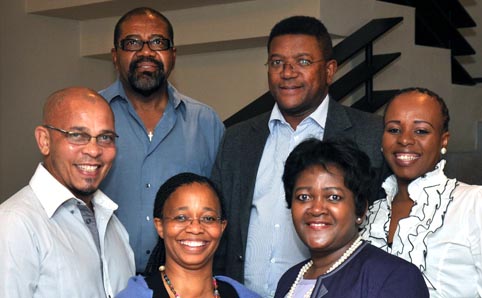 |
|
Some of the Senior Student Affairs Professionals present at the meeting were back row from left: Dr Llewellyn MacMaster, Dean of Student Affairs: Stellenbosch University; Profs. Bobby Mandew, Dean of Student Affairs: University of Johannesburg; McGlory Speckman, Dean of Student Affairs: University of Pretoria; and Ms Babalwa Ntabeni-Matutu, Department of Higher Education and Training. Front from left are: Dr Choice Makhetha and Ms Khanyisile Nyembenzi, SAASSAP Project Officer from the University of KwaZulu-Natal.
Photo: Stephen Collett
|
The Deans of Students of thirteen of the country’s universities recently gathered at the University of the Free State's (UFS) Bloemfontein Campus to attend the Deans’ Forum of the South African Association of Senior Student Affairs Professionals (SAASSAP).
The heads of Students Affairs from universities such as Stellenbosch, Johannesburg and Pretoria discussed challenges facing higher education institutions and shared campus experiences during their meeting.
Dr Choice Makhetha, Acting Vice-Rector: External Relations at the UFS and President of SAASSAP, says the issues that were addressed included registrations and poverty on campuses. Dr Makhetha, who is serving a second term as president of the organisation, says they came up with strategies on how to support campuses in partnership with the Department of Higher Education and Training.
SAASSAP will host its 14th national conference next year from 24 - 26 October in Bloemfontein. The UFS and the Central University of Technology will host the conference together and it is expected that all twenty three member institutions as well as Student Affairs Associations from abroad will attend.